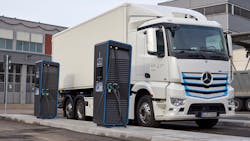If you have not had a chance to read GNA’s The State of Sustainable Fleets 2020, I encourage you to do so. GNA says the report is technology-neutral and comprehensive. The report “examines the current state of the most prevalent sustainable vehicle platforms for medium- and heavy-duty on-road transportation fleets across the U.S., while analyzing the trends shaping the future of the industry.”
It’s a good report, but I might be a bit biased because NACFE provided various inputs for it. We helped with the diesel and gasoline efficiency chapter as well as authored a Perspective on the future of efficiency efforts on alternative fuel vehicles. The report covers diesel and gasoline vehicles — which serve as the benchmark for emerging technologies as well as natural gas vehicles, propane-powered vehicles, battery-electric vehicles and hydrogen fuel cell electric vehicles.
One of the key takeaways from the report, in my opinion, echoes what NACFE found in its Guidance Report: Viable Class 7/8 Electric, Hybrid, And Alternative Fuel Tractors. And that is that we are in the messy middle when it comes to how medium- and heavy-duty vehicles are powered.
Diesel and gasoline trucks will remain dominant for another decade in the heavy-duty market segment, but fleets are also beginning to explore, order, purchase and put into service some of these alternative fueled vehicles that are now available from a variety of manufacturers.
There is no one right answer when it comes to selecting an alternative fueled vehicle. Duty cycle matters, as does range, the ability to get it fueled and its total cost of operation.
One thing GNA found in its research for the report is that while in the past TCO may have been the sole reason fleets look at alternative-fueled vehicles, today they are also doing so to meet environmental sustainability efforts.
This is not to say that TCO does not matter — it will always be an important measurement — but fleets are looking beyond that to see what they can do to reduce emissions and reduce their carbon footprint.
The State of Sustainable Fleets 2020 provides some good insights into current and future adoption of alternative vehicle technology and might even help you navigate the messy middle.
______________________________
Michael Roeth has worked in the commercial vehicle industry for nearly 30 years, most recently as executive director of the North American Council for Freight Efficiency. He currently serves on the second National Academy of Sciences Committee on Technologies and Approaches for Reducing the Fuel Consumption of Medium and Heavy-Duty Vehicles and has held various positions in engineering, quality, sales and plant management with Navistar and Behr/Cummins.
About the Author

Michael Roeth
Executive Director
Michael Roeth is the executive director of the North American Council for Freight Efficiency. He serves on the second National Academy of Sciences Committee on Technologies and Approaches for Reducing the Fuel Consumption of Medium and Heavy-Duty Vehicles and has held various positions with Navistar and Behr/Cummins.
